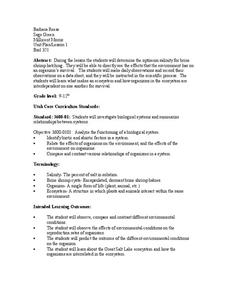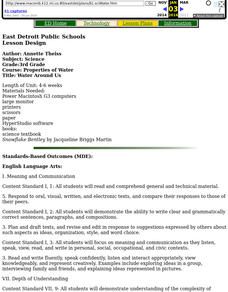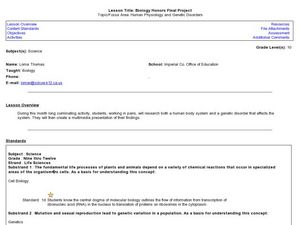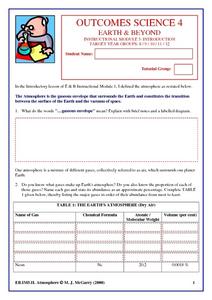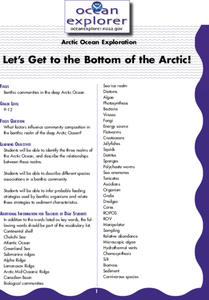Curated OER
Hatching Brine Shrimp
Third graders investigate the environment that is considered favorable for brine shrimp hatching. The salinity level is of particular interest in the observations because the optimum level is needed for survival. They make daily...
Curated OER
Environmental Risk Management
Middle schoolers investigate the concepts related to managing the environment. They conduct research using a variety of resources. Students cite examples of different organisms that have been targeted to become endangered. They answer...
Curated OER
Identification of Wildfire/Structure Interfaces, Risk Assessment of Structures, and Risk Management
Students participate in a class discussion about wildfire and urban interfaces as well as risk of wildfire in the area in which they live. After reviewing a wildfire/urban interface fire safety checklist, a walking field trip is...
Curated OER
Water Around Us
Third graders learn the effects of temperature on the states of water. Then students create paper snowflakes. Finally students complete a computer project with software which teaches the different states of water.
Curated OER
Leaf Slides
Pupils, in groups, examine leaf slides in order to explore the detail in leaves.
Curated OER
Nebraska Rocks & The Rock Cycle
Middle schoolers study the rock cycle and relate it to rocks that are indigenous to Nebraska. Students collect rocks and draw a diagram of the rock cycle using their collection.
Curated OER
Choose Your Own Soil Adventure
Ninth graders will use a soil survey to make management decisions and by interpreting geologic maps. The importance of different soil types is discussed and the implications of how soil can be useful for our communities.
Curated OER
SIM Ecosystem
Students identify and interpret the concept of an ecosystem and the potential impact humans have on ecosystems. They also proficient in organized and methodical Internet searches. Finally, students become proficient with public...
Curated OER
Light and Optics
Students discover the relationship between lens shape and the formation of images in an experiment. They use three different size converging lenses and a diverging lens to calculate and compare the focal length of each. They graph and...
Curated OER
Mechanisms to Fight Disease
Students explain how our body fight diseases. In this biology lesson plan, students identify the role of bacteria and viruses in human illness. They create a PowerPoint presentation and essay at the of the unit.
Curated OER
Biology Honors Final Project
Tenth graders work on a project about cellular biology and genetics. In this biology instructional activity, 10th graders research about the assigned human body system and genetic disorders that affect it. They create a multimedia...
Curated OER
Weather and Climate Lesson Plan
Students distinguish between weather and climate and give examples of weather in their town, and examples of climate in their town.
Curated OER
Ozone Pollution: Smog Alert
Students simulate the development of smog. They discover how it forms naturally in nature. They read news articles about the ozone and pollution. They discuss what they can do to lower the pollution they generate.
Curated OER
Make a Cast of a Tyrannosaurus rex Fossil
Second graders examine the formation of fossils and list the different types. They make cast model of a dinosaur fossil. They write about conditions that are necessary for fossils to form and create a model of a buried fossil.
Curated OER
Scientific Approach to Forest Management
Students use wireless laptop computers to collect, store, communicate, and organize data from the 1999 Jasper Fire area. They collect data in the field and compare it to student-collected data from prior years to develop conclusions...
Curated OER
Peru's Earthquake
Young scholars identify the patterns of earthquakes by mapping USGS data and comparing it to mapped tectonic plates. They discover the relationship between earthquakes and the moving plates of the Earth's crust.
Curated OER
Relational Causality
Students explore the concept of Bernoullii's Principle and how it behaves. Have each student fold the piece of paper in half. Then have them place the paper like a tent on a smooth surface. Have them blow under it (they can use a straw...
Curated OER
Earth and Beyond
In this earth and beyond worksheet, students answer short answer questions about the atmosphere, the chemical compounds in Earth's atmosphere. Students visit different websites to conduct research of the discoveries of the scientist who...
Curated OER
Lights in the Deep
Students describe, compare, and contrast bioluminescence, fluorescence, phosphorescence, and chemiluminescence. They explain the role of three major components of bioluminescent systems. They ex
Curated OER
Seals, Corals and Dollars
Students described the ecological relationships between Hawaiian monk seals and deep-water precious corals. They describe and explain at least two different viewpoints on how monk seals and precious coral resources
Curated OER
An Underwater Sediment Slide?
Students explore the proximity of the Hudson Shelf Valley and the Hudson Canyon to one of the Nation's most populated areas. They study that from 1987 to 1992, two dumpsites in the Hudson Shelf Valley and Hudson Canyon, one 12 miles
Curated OER
Let's Get to the Bottom of the Arctic!
Students identify the three realms of the Arctic Ocean, and describe the relationships between these realms. They describe different species associations in a benthic community.
Curated OER
Light at the Bottom of the Deep, Dark Ocean?
Students participate in an inquiry activity. They relate the structure of an appendage to its function. They describe how a deepwater organism to its environment without bright light.
Curated OER
Spawn!
Pupils explain that the ability of certain reef fishes to have a successful spawning is dependent on numerous environmental conditions. They list some of the factors needed by reef fishes in the South Atlantic Bight to have a


